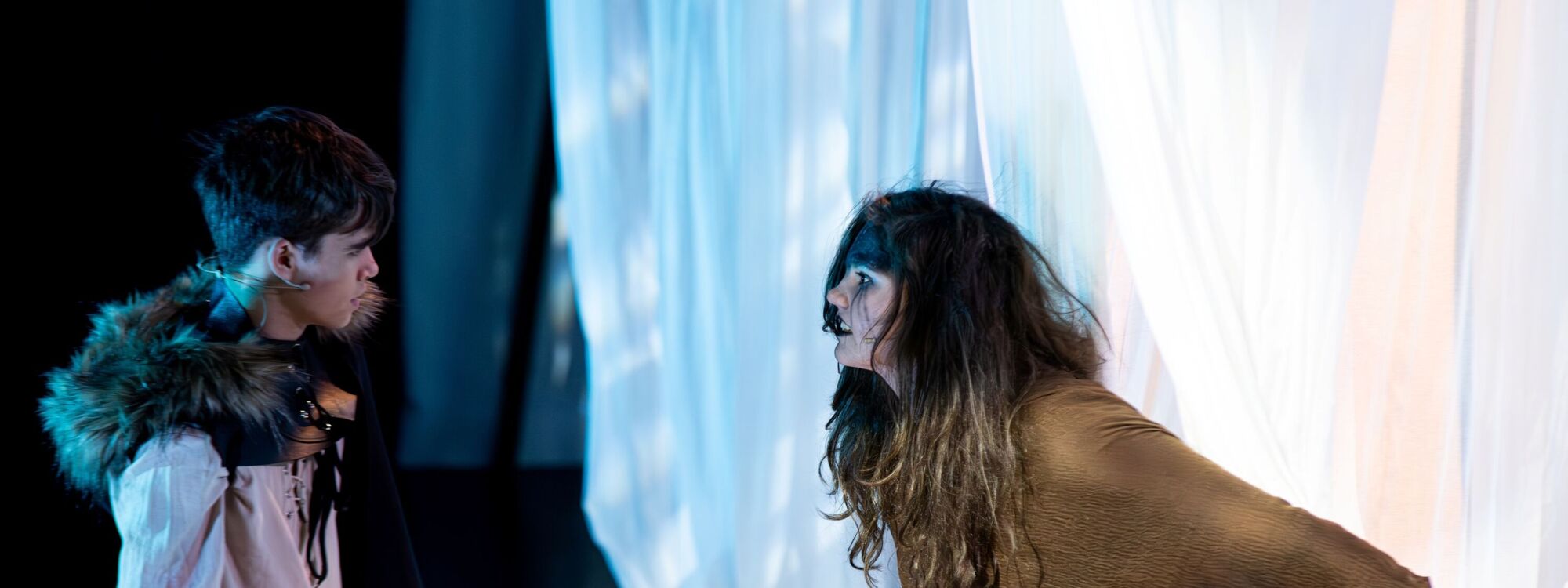Drama and Theatre Studies
A vibrant, creative, challenging and stimulating course.
Drama and Theatre Studies is a vibrant, creative, challenging and stimulating course which prepares students to enter the industry. It allows students to develop theatrical skills that will allow them to perform on stage and create innovative relevant contemporary theatre from a directional and design perspective. Students will also hone important transferable life skills such as negotiation, cooperation, creativity, time management, and improve their abilities in public speaking and commanding the attention of the audience.
Entry Requirements
Grade 6 in Drama if studied at GCSE.
During the course you will undertake practical performance work, as well as studying significant plays and relevant theatre practitioners and genres. You will develop your ability to analyse contemporary productions from the perspectives of actor, director and designer. You will acquire skills such as lighting, set and costume and make-up design. We prefer you to have a good grade at GCSE Drama to take this course, but we do not insist on it. More important is that you have an open and enquiring mind, a genuine interest in theatre, be willing to work collaboratively and have a good work ethic and are prepared to have a go at any challenge we throw at you!
Topics Covered
Over the two year course, students will:
• Develop and apply an informed, analytical framework for making, performing, interpreting and understanding drama and theatre.
• Understand the place of relevant theoretical research in informing the processes and practices involved in creating theatre and the place of practical exploration in informing theoretical knowledge of drama and theatre.
• Develop an understanding and appreciation of how social, cultural and historical contexts of performance texts have influenced the development of drama and theatre.
• Understand the practices used in 21st century theatre making .
• Experience a range of opportunities to create theatre both published text-based and devised work.
• Participate as a theatre maker and as an audience member in live theatre.
• Understand and experience the collaborative relationship between various roles within theatre.
• Develop and demonstrate a range of theatre making skills.
• Develop the creativity and independence to become effective theatre makers.
• Analyse and evaluate their own work and the work of others.
Methods of Assessment
Component 1: Drama and Theatre
This component is a written exam in which students are assessed on their knowledge and understanding of how drama and theatre is developed and performed (AO3) and on their ability to analyse and evaluate the live theatre work of others (AO4).
The paper constitutes 40% of the A-level.
Students have 3 hours to answer the paper. The paper is divided into three compulsory sections:
- Section A: Drama through the ages
- Section B: 20th and 21st century drama
- Section C: Live theatre production.
Component 2: Creating Original Drama
This is a practical component in which students are assessed on their ability to create and develop ideas to communicate meaning as part of the theatre making process making connections between dramatic theory and practice (AO1) and apply theatrical skills to realise artistic intentions in live performance (AO2).
Component 2 constitutes 30% of the A-level.
It is marked by teachers and moderated by AQA.
For this component, students must complete two assessment tasks:
- produce an individual Working notebook documenting the devising process
- contribute to a final devised, group performance.
The Working notebook is marked out of 40.
Each student's contribution to the final devised performance is marked out of 20.
Component 3: Making Theatre
This is a practical component in which students are assessed on their ability to apply theatrical skills to realise artistic intentions in live performance (AO2) and analyse and evaluate their own work (AO4).
Component 3 constitutes 30% of the A-level.
It is marked by AQA.
For this component students must practically explore (workshop) and interpret three key extracts each from a different play and complete two assessment tasks:
- formally present Extract 3 to an audience
- produce an individual Reflective report analysing and evaluating their theatrical interpretation of all three key extracts studied.
Each student's contribution to the performance of Extract 3 is marked out of 40.
Their Reflective report is marked out of 20.
For the performance of Extract 3 students must apply the work and methodologies of one of the prescribed theatre practitioners
Enrichment Opportunities
There will be compulsory theatre trips throughout the course. There is also a compulsory devising weekend in October. There will also be extra workshops organised to connect students with contemporary theatre practitioners and professionals.
Meet the Staff
If you have a specific enquiry for the Drama Department, email Drama@kes.school
| Mrs LA Gilmour BA | Head of Drama
|
| Mrs FC Bailey BA | Teacher of Drama |




